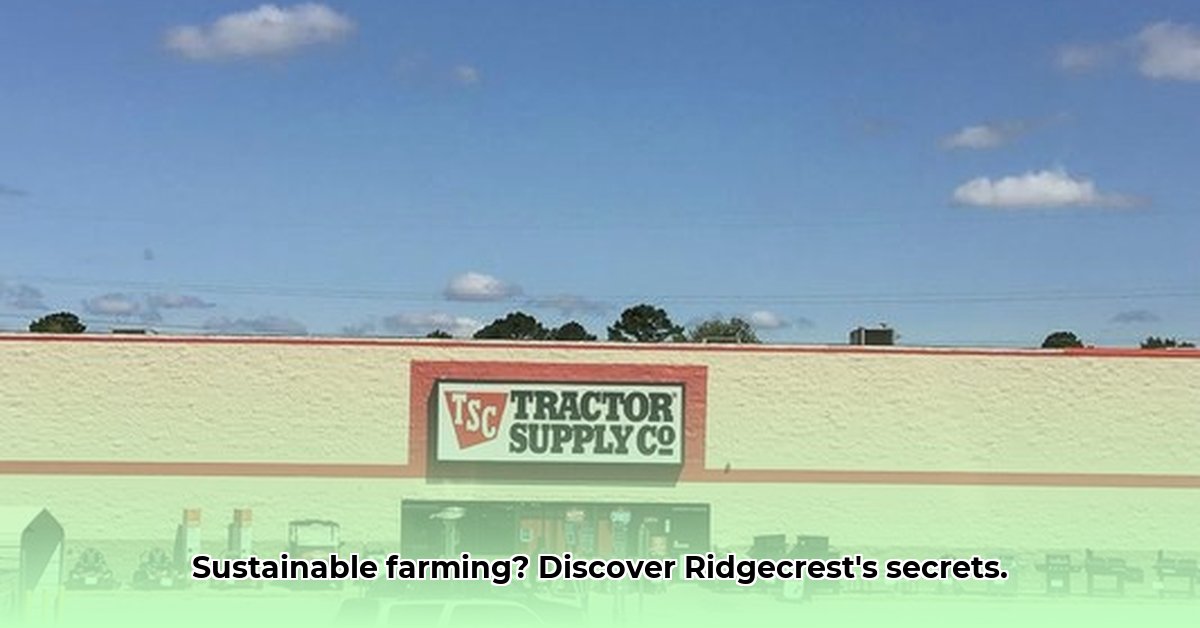
Assessing Tractor Supply's Contribution to Sustainable Agriculture in Ridgecrest
Tractor Supply Company (TSC) plays a significant role in the agricultural landscape of Ridgecrest, California. However, evaluating its contribution to sustainable farming practices requires a nuanced approach, considering both the direct actions of the company and its indirect influence on local agricultural methods. While TSC offers products that could support sustainable agriculture, a comprehensive assessment is hampered by a lack of readily available data and transparency. For more information on TSC products, check out this helpful resource.
Direct Operational Sustainability: A Data Deficit
Assessing TSC's direct environmental impact in Ridgecrest necessitates a review of its operational practices. This involves examining energy consumption, waste management strategies, and the overall environmental footprint of the Ridgecrest store. Unfortunately, readily available data on these KPIs (Key Performance Indicators) is lacking. Does the store utilize energy-efficient lighting and refrigeration? What percentage of its waste stream is diverted from landfills through recycling programs? Without this information, a complete evaluation of TSC's direct operational sustainability is impossible. A crucial first step is demanding increased transparency from TSC regarding these operational metrics. This would allow for a more accurate assessment of the company's direct environmental impact.
The Indirect Impact: Supporting Sustainable Farming Practices?
TSC's indirect impact stems from its role as a supplier of agricultural inputs to local farmers and gardeners. The availability and promotion of sustainable products within its Ridgecrest store significantly influence the practices adopted by the community. Does the store stock a substantial range of organic seeds, biopesticides (pesticides derived from natural sources), and water-efficient irrigation systems? What percentage of its product inventory aligns with sustainable agricultural principles? These questions are crucial to understanding TSC's indirect contribution to sustainable agriculture. Further research, including surveys of local farmers and detailed product audits, is needed to fully grasp this element. This investigation should also assess whether TSC actively promotes or educates its customers on sustainable practices.
The Transparency Gap: A Critical Roadblock
A significant challenge in evaluating TSC's sustainability efforts lies in the lack of transparency surrounding its environmental practices. The company's online presence provides limited information on its sustainability initiatives, leaving a critical knowledge gap. Without publicly accessible data on supply chain sustainability, waste reduction strategies, and community involvement in environmental projects, formulating a robust assessment becomes extremely difficult. This lack of transparency is a major hurdle, and until TSC commits to greater data disclosure, a full and fair evaluation isn't possible. The absence of this data prevents a precise determination of the company’s true commitment to sustainable agriculture.
A Framework for Future Assessment: Actionable Steps
Despite data limitations, a structured approach can help assess TSC's sustainability efforts:
Demand Transparency: Advocating for the publication of detailed sustainability reports, including key performance indicators (KPIs) related to energy use, waste management, and supply chain practices, is critical.
Engage with Stakeholders: Conducting surveys and interviews with local farmers and community members provides valuable insights into how TSC's products and practices influence their farming choices.
Conduct Product Audits: Detailed analyses of TSC's product offerings in Ridgecrest should be undertaken to quantify the proportion of products that align with sustainable agricultural principles.
Benchmark Against Competitors: Comparing TSC's performance against industry benchmarks in supply chain transparency and sustainable product offerings reveals areas for improvement.
Long-Term Monitoring: Tracking changes in TSC's practices and sustainability reporting over time allows for an assessment of progress (or the lack thereof).
By implementing these steps, we can create a more accurate and comprehensive evaluation of Tractor Supply's contribution to sustainable agriculture in Ridgecrest, moving beyond speculation and focusing on concrete, data-driven analysis. The ultimate goal is a robust assessment based on facts, not assumptions.